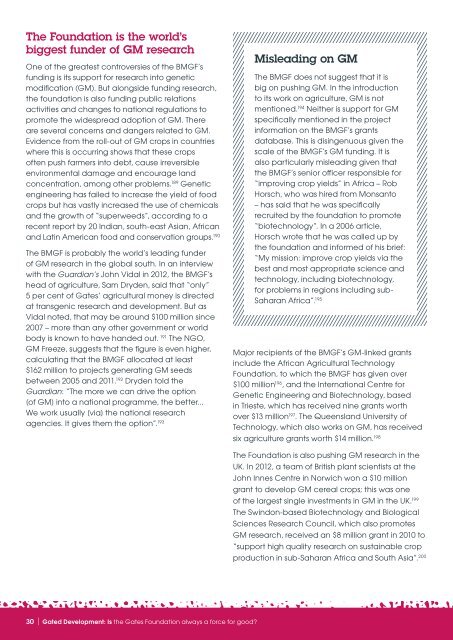Gated Development
gated_development_final_version
gated_development_final_version
Create successful ePaper yourself
Turn your PDF publications into a flip-book with our unique Google optimized e-Paper software.
The Foundation is the world’s<br />
biggest funder of GM research<br />
One of the greatest controversies of the BMGF’s<br />
funding is its support for research into genetic<br />
modification (GM). But alongside funding research,<br />
the foundation is also funding public relations<br />
activities and changes to national regulations to<br />
promote the widespread adoption of GM. There<br />
are several concerns and dangers related to GM.<br />
Evidence from the roll-out of GM crops in countries<br />
where this is occurring shows that these crops<br />
often push farmers into debt, cause irreversible<br />
environmental damage and encourage land<br />
concentration, among other problems. 189 Genetic<br />
engineering has failed to increase the yield of food<br />
crops but has vastly increased the use of chemicals<br />
and the growth of “superweeds”, according to a<br />
recent report by 20 Indian, south-east Asian, African<br />
and Latin American food and conservation groups. 190<br />
The BMGF is probably the world’s leading funder<br />
of GM research in the global south. In an interview<br />
with the Guardian’s John Vidal in 2012, the BMGF’s<br />
head of agriculture, Sam Dryden, said that “only”<br />
5 per cent of Gates’ agricultural money is directed<br />
at transgenic research and development. But as<br />
Vidal noted, that may be around $100 million since<br />
2007 – more than any other government or world<br />
body is known to have handed out. 191 The NGO,<br />
GM Freeze, suggests that the figure is even higher,<br />
calculating that the BMGF allocated at least<br />
$162 million to projects generating GM seeds<br />
between 2005 and 2011. 192 Dryden told the<br />
Guardian: “The more we can drive the option<br />
[of GM] into a national programme, the better...<br />
We work usually [via] the national research<br />
agencies. It gives them the option”. 193<br />
Misleading on GM<br />
The BMGF does not suggest that it is<br />
big on pushing GM. In the introduction<br />
to its work on agriculture, GM is not<br />
mentioned. 194 Neither is support for GM<br />
specifically mentioned in the project<br />
information on the BMGF’s grants<br />
database. This is disingenuous given the<br />
scale of the BMGF’s GM funding. It is<br />
also particularly misleading given that<br />
the BMGF’s senior officer responsible for<br />
“improving crop yields” in Africa – Rob<br />
Horsch, who was hired from Monsanto<br />
– has said that he was specifically<br />
recruited by the foundation to promote<br />
“biotechnology”. In a 2006 article,<br />
Horsch wrote that he was called up by<br />
the foundation and informed of his brief:<br />
“My mission: improve crop yields via the<br />
best and most appropriate science and<br />
technology, including biotechnology,<br />
for problems in regions including sub-<br />
Saharan Africa”. 195<br />
Major recipients of the BMGF’s GM-linked grants<br />
include the African Agricultural Technology<br />
Foundation, to which the BMGF has given over<br />
$100 million 196 , and the International Centre for<br />
Genetic Engineering and Biotechnology, based<br />
in Trieste, which has received nine grants worth<br />
over $13 million 197 . The Queensland University of<br />
Technology, which also works on GM, has received<br />
six agriculture grants worth $14 million. 198<br />
The Foundation is also pushing GM research in the<br />
UK. In 2012, a team of British plant scientists at the<br />
John Innes Centre in Norwich won a $10 million<br />
grant to develop GM cereal crops; this was one<br />
of the largest single investments in GM in the UK. 199<br />
The Swindon-based Biotechnology and Biological<br />
Sciences Research Council, which also promotes<br />
GM research, received an $8 million grant in 2010 to<br />
“support high quality research on sustainable crop<br />
production in sub-Saharan Africa and South Asia”. 200<br />
30 I <strong>Gated</strong> <strong>Development</strong>: Is the Gates Foundation always a force for good?


